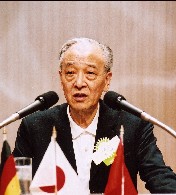��Recent International Situation and Japanese Diplomacy�ɡ�
July 12, 2006
Mr. Hisahiko Okazaki,
Director of the Okazaki Institute
 ��There appears to be an agreement of opinions among Japan-US experts and commentators in their views as to the rationale for the timing of North Korea��s firing of Taepodong, Nodong, and Scud missiles, that being North Korea��s desire to elicit a direct negotiation with the United States. From historical experience, this is an appropriate judgment. North Korea has, in the past, been successful in gaining some concessions through bilateral negotiations between the two countries.
��There appears to be an agreement of opinions among Japan-US experts and commentators in their views as to the rationale for the timing of North Korea��s firing of Taepodong, Nodong, and Scud missiles, that being North Korea��s desire to elicit a direct negotiation with the United States. From historical experience, this is an appropriate judgment. North Korea has, in the past, been successful in gaining some concessions through bilateral negotiations between the two countries.
��North Korea, when they declared their withdrawal from the Nuclear Non-Proliferation Treaty in 1993, and would undertake nuclear development and reprocessing of plutonium, negotiated with the United States, and was able to obtain the construction of a light-water nuclear reactor and a supply of 500,000 tons of oil annually. In 1998, when signs that North Korea was undertaking nuclear development through the construction of an underground plant, or creating a dam for power supply, it fired the Taepodong missile.
��Again, after negotiations with the United States a thorough inspection of the facility was undertaken and firing of the Taepodong missile was frozen. Both the United States and Japan declared that no compensation would be paid, but under the guise of the reopening of humanitarian aid, several hundreds of thousands of tons of food were sent.
��There is precedence for intimidation to obtain real gain, but whether this time that would apply is dubious. North Korea dearly wants the United States to lift the financial sanctions. The shutting down of money laundering via Macao seems to have caused some real damage.
��Nodong, with a range of 1000 kilometers to 1600 kilometers, that was fired this time, if fired from Western Iran can cover the entire territory of Israel. It showed that Nodong��s extreme accuracy. There is some speculation that the firing was meant as an advertisement directed to Iran.
��The Japanese government��s response to the missile firing was extremely swift, and it was the quickest response made in the past 60 years of Japanese diplomatic history. This was a new challenge for Japanese diplomacy. Japan took a central role in the drafting of a resolution to be submitted to the Security Council. Russia and China, however, do not seem overly pleased to see Japan taking the leadership role.
��This time, there was some significance in Japan taking an extremely rapid response. Japan had decided on all of the measures by the night of the 5th, which is 4th US time. Richard Lee Armitage jokingly remarked, ��North Korea raised fireworks for Independence Day in U.S. They have a great sense of humor.��
��It is normal for North Korea to make the formal announcement 3 or 4 days after the event, but this time was the exception to the rule, and they made their stance clear in the morning of the 6th. Their logic is, ��It is natural for any country that has created missiles to test the missile over open seas. A pledge to freeze the missile program is conditional upon the construction by the United States of light-water reactors and the provision of oil. For Japan, it is conditional upon the normalization of diplomatic relations. Thus, this firing is not contrary to any pledges made.��
��A counter-proposal by China is to make a Secretary General address with the content almost identical to the Japanese proposal. Having the same contents as the Japanese proposal appears to mean that China has resigned itself to accepting the mood created by Japan that North Korea was wrong, and therefore it must be punished.
��Up until now, the focus has been on, ��what to do if North Korea goes into disarray?�� Thinking by Kim Dae Jung appears to take the opportunistic view, ��Japan-Korea normalization can precede. After living standards in the North have improved somewhat thanks to the normalization, unification can take place.��
��China, with a growing sense of confidence with its economic growth, from a geopolitical perspective, now appears to think that it would be better, after all, to have North Korea as its subservient. Last year, North Korea ceased rationing. China and South Korea provided aid and from this January rationing was reinstated. In particular, North Korea has mineral resources. It appears that through investments they want to place North Korea under their wings.
��North Korea also has not another country to depend on other than China. The Far Eastern political map appears to be coming together to this scenario.